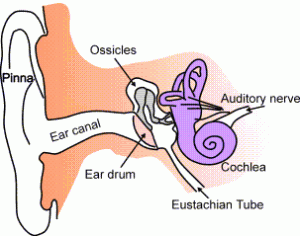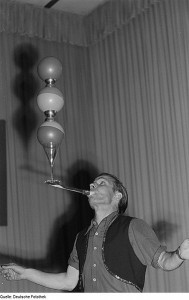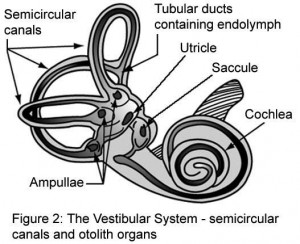
29 Apr vestibular system and balance
A friend of mine asked me to do some research into an ailment that is bothering him. He describes it as a cross between being drunk and drugged, and feels that his gyro is out. I suppose this is a relatively common ailment in the later years, but it is no way to live and I am doing some research into what could be going on. For something completely different, the doctors either ignore him, or pass him off as a healthy man. So he is getting frustrated, and this is where I come in!
The balance system of humans is orchestrated by three senses. Vision or input through the eyes, movement sensors in the skin, muscles and joints and the inner ears or vestibular system.
 The vestibular system comprises of three fluid filled loops, as can be seen between the ossicles and the auditory nerve. These loops respond to rotation of the head, and near these canals are the utricle and saccule which respond to gravity and backwards and forwards motion.
The vestibular system comprises of three fluid filled loops, as can be seen between the ossicles and the auditory nerve. These loops respond to rotation of the head, and near these canals are the utricle and saccule which respond to gravity and backwards and forwards motion.
When the head rotates in the direction sensed by a particular canal, the endolymphatic fluid within it lags behind because of inertia and exerts pressure against the canal’s sensory receptor. The receptor then sends impulses to the brain about movement. When the vestibular organs on both sides of the head are functioning properly, they send symmetrical impulses to the brain.
The information from these three sensory systems, eyes, muscles / nerves and vestibular systems are then sent to the brain stem and sorted out through the brain cerebellum to provide spatial and balance information.
 If the brain receives conflicting information between the three senses, this when a balance or dizziness disorder can come in.
If the brain receives conflicting information between the three senses, this when a balance or dizziness disorder can come in.
It would seem that if balance and coordination is an issue, there might be something amiss in the vestibular system.
Although some specialists do assert that in some cases, no cause can be attributed to these dizziness disorders.
First things first. National Hearing Care is doing testing in this area at the moment, and I think it would be prudent for my friend to get his ears checked.
Obviously, I am also wondering if there is a set of nutritional standards for good ear health. My doctor did tell me that all the inner ear problems, tonsils and adenoid problems I had when I was a child was a sure sign that I am intolerant to dairy, so one of the first questions I will ask my friend is if he had any ear nose and throat problems as a child.
More overtly though, it would seem that physical therapy is very useful in the treatment of vestibular conditions. A trained therapist can guide the patient through a variety of exercises that will retrain the brain to respond to appropriate vestibular signals. Furthermore some of the minute particles of the inner ear that may have been dislodged through age can be repositioned through physical therapy. This kind of therapy is effective in 80% of cases relating to the vestibular system.


No Comments